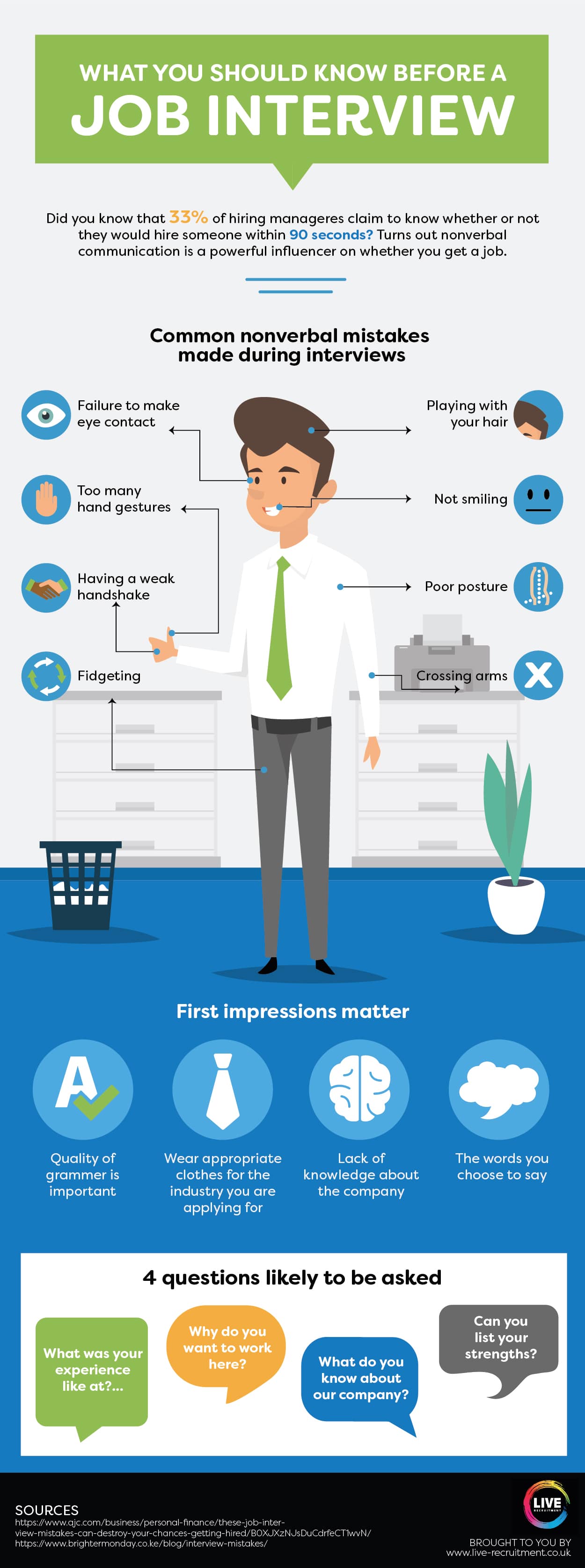Going for a job interview is a stressful process and sorry, but this fact might make it wore – 33% of hiring managers know whether or not they will hire someone within the first 90 seconds of an interview. The main reason for this is because they learn to watch for nonverbal communication that we all use but don’t always realize it. So if you want to increase your chances at your next interview, here are some important things to know – straight from those hiring managers.
IMAGE: PIXABAY
Common Nonverbal Mistakes
It is true that controlling your body language can be difficult, especially when you are concentrating on what you are saying. But there are some things you can teach yourself before you go to an interview that mean you can avoid the most common nonverbal mistakes that people make. These are the mistakes that can make a hiring manager make that snap decision against you.
1. Failure To Make Eye Contact
Not everyone is comfortable making eye contact, but it is an important thing to work on for job interviews. Of course, you don’t want to spend the whole time starting someone straight in the eye – that can seem confrontational and a bit strange. But make sure you meet their eyes regularly, especially when you first enter the interview.
2. Crossing Your Arms
This is one of the most famous nonverbal cues and is something we all do when we aren’t happy or are nervous. It is a defensive reaction to being uncomfortable and portrays a sense of being closed off or disinterested.
3. Have A Strong Handshake
This one applies to women as well – if someone reaches out to shake your hand, return a firm handshake. A limp or half-done handshake gives a strange, negative vibe.
4. Using Your Hands Too Much
If you talk with your hands, it is hard but try not to do it too much in an interview. Even if it means folding them neatly in your lap and keeping them there. Hand gestures are okay but if you spend too much time waving your hands around, people get distracted from what you are saying
5. Don’t Fidget Or Play With Your Hair
Fidgeting, playing with your hair, twirling your ring or other little habits are a sign of nerves and while these are okay you want to try to hide them as much as possible – because they are also distracting.
6. Slouching In The Seat
Sitting upright with good posture is a strong nonverbal signal that you are interested, engaged and this is important whereas slouching makes you seem somehow disengaged and bored.
7. Not Smiling
Smiling during an interview warms up your whole face and makes people smile too. You don’t have to grim the whole time – this looks a bit strange – but make sure you go through the facial expressions and smile when suitable.
First Impressions Matter
Working on these nonverbal communications is an important part of preparing for your interview. However, the most important part is those key 90 seconds where you make that first impression. There are several key things to watch for:
- Quality of grammar – make sure you speak clearly and concisely
- Dress code – make sure you are wearing appropriate clothes for the occasion
- Do some research – make sure you know plenty about the company as you are often asked early questions about it
By making a great first impression and using positive nonverbal communications, you are already ahead of other people in for the same role. Remember, hiring managers want to hire you – your job is to make it easy to do that.
Infographic brought to you by Live Recruitment, an events recruitment agency, based in London & Birmingham UK.
If you are interested in even more lifestyle-related articles and information from us here at Bit Rebels then we have a lot to choose from.


COMMENTS